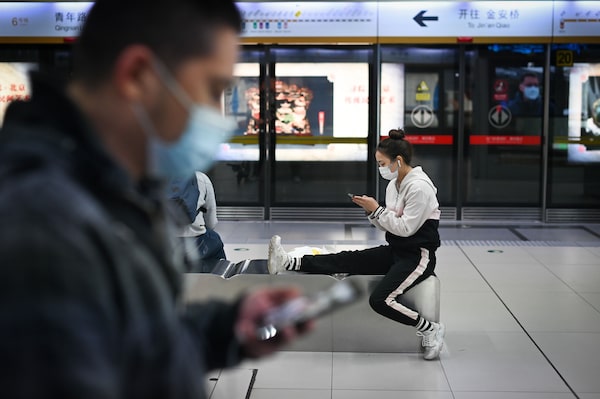
A woman (R) wearing a face mask uses her mobile phone at a subway station in Beijing on April 11, 2020.WANG ZHAO/AFP/Getty Images
Journalism student Zhang Wei was standing on a subway platform in Guangzhou, a metropolis in southern China, last month, when she caught sight of a man crouched down, appearing to take a photo of her.
Turning on her own camera, Ms. Zhang confronted him and demanded to see his phone, which he handed over, showing that there were no images of her on it. Ms. Zhang warned him not to film people in public, and later posted about the incident online, suggesting that the man might have deleted photos he took and accusing him of “shameless behaviour.”
After the man’s son, surnamed Deng, saw the post, he contacted local police to complain, and Ms. Zhang eventually issued a public apology, saying she had made a mistake. But while the Dengs said they were satisfied and didn’t wish the student any ill will, the backlash against her was only just getting started.
For days, Ms. Zhang’s name was trending on Chinese social media, with many calling for her to be prosecuted for libel and expelled from university. When administrators decided not to act, multiple businesses said they wouldn’t hire Sichuan University graduates in future. Others called for all journalism courses to be scrapped, saying they were cradles of harmful “Western thought.”
For many women, China’s internet can feel like being on an uneven playing field. For years now, feminists have been subject to intense censorship, with Weibo, China’s equivalent of Twitter, deleting the accounts of more than 20 prominent activists in 2021 on the grounds that they were promoting “extreme and ideological content.”
“Feminist voices are not as strong as they were 10 years ago,” said Ai Xiaoming, a documentarian and former women’s studies professor. “Nowadays, with censorship being so severe, it’s hard to really say anything online.”
At the same time that Ms. Zhang was going viral, the BBC released a documentary exposing the Japan-based Chinese owner of a website selling illegal videos of women being assaulted on public transport across East Asia, including in China. Discussion of it was swiftly censored on the Chinese internet, while state media framed the issue as solely a Japanese problem. Past surveys found that more than 40 per cent of women respondents said they had been harassed or worse on public transport in China.
“What Zhang Wei experienced is just a microcosm of the many witch hunts against women,” said Xie Bingyi, a Chinese feminist activist and student at the University of London’s School of Oriental and African Studies. She added that it was typical of a misogynistic culture that “will infinitely glorify men’s merits and whitewash their faults, while at the same time infinitely devaluing women’s merits and exaggerating their faults.”
Ms. Xie knows this from personal experience. After she was assaulted by another Chinese student at Yale University, she posted about him online, after which she said she was harassed and demeaned as a woman by strangers on social media.
This led her to initially retreat, confining herself to writing feminist tracts on WeChat, a messaging and social-media app, where they were mostly read by like-minded followers. But eventually Ms. Xie said she “decided to get out of my comfort zone.” She began posting on Weibo, where she now has around 25,000 followers.
After Ms. Xie encouraged women in a series of posts earlier this year to out men who assaulted them, she was targeted by several chat groups and forums known for co-ordinated harassment. Her phone and ID numbers were posted online, as were those of her family, and some users fantasized about paying for an assassin to kill her.
When she complained about the harassment online, Ms. Xie said prominent men’s rights activists accused her of deserving such treatment, pointing to previous writing by her that they said was “extremist” or “anti-men.” To this day, Ms. Xie said she regularly receives death threats and other harassment.
The stifling of women’s voices is taking place amid a rollback of rights nationwide, as China’s leaders attempt to tackle a falling birth rate after decades of restricting the number of children women could have. New restrictions have been placed on the right to divorce, along with limits on “non-medical” abortions, and young women have faced growing pressure to become mothers.
China’s #MeToo movement has also struggled to get traction. In one high-profile case, journalist Zhou Xiaoxuan had a sexual-harassment case against a state TV anchor rejected by a court on insufficient evidence grounds, seen as a major setback for other women pursuing such difficult-to-prove cases.
“Is it true that if sexual harassment occurs in a closed space, as long as the other party completely denies it, and as long as there is no video recording of the whole process, the woman can only be silent and cannot seek justice in the court?” Ms. Zhou said outside court last year.
Those who do write publicly about feminism or women’s issues often face harassment of the type Ms. Xie experienced. In April of 2021, several anonymous female artists collected more than a thousand abusive messages and blanketed a hill with them, printed in the style of Chinese propaganda posters, to create what they called an “Internet Violence Museum.”
As well as Weibo, posts attacking feminists or encouraging harassment are common on bulletin-board services Tieba and Hupu. A recent analysis by The Globe and Mail found thousands of posts on Tieba, owned by Chinese search giant Baidu, discussing “fishing” expeditions in which men target feminists online and try to trick them into saying something embarrassing or sharing personal images and information.
Hupu, which has received investment from TikTok owner ByteDance, has been described as a “straight-men platform” or male equivalent to Xiaohongshu, an Instagram-like platform popular with young women. The site, which attracts about 50 million monthly active users, around 90 per cent of whom are male, is known for discussions ranking the attractiveness of female celebrities and promoting “incel” culture, a misogynistic ideology that blames women and feminism for men not having enough sex.
Baidu and Hupu did not respond to a request for comment about their policies on targeted harassment and content.
Prof. Ai, the documentarian, said it can often seem like misogynist voices are louder online, but this is because those who disagree have often been “forcefully silenced.”
“If the two sides could speak equally, we might see things differently,” she added.
Ms. Xie, the activist, was cautiously hopeful, saying she felt that some of the intense backlash she and others have experienced was because women were making slow progress in carving out a space online, despite all the difficulties.
“These men fear the power of Chinese women and development of feminism in China,” Ms. Xie said. She added that she admired those who “choose not to cry, not to give up.”
 James Griffiths
James Griffiths